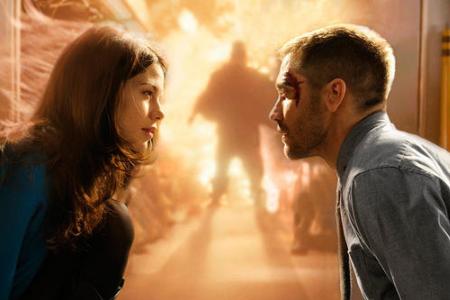Source Code (2011)

Oh, how to relate the plot?
Jake Gyllenhaal (Prince of Persia, Jarhead) stars as Air Force Captain Colter Stevens, a U.S. pilot in the War in Afghanistan who finds himself inhabiting the body of a different man, a teacher named Sean Fentress, aboard a Chicago train about to be blown to smithereens due to a bomb placed on board. After he expires, he finds himself in some sort of pod where he gets bits and pieces of the reasons why, involving a scientific breakthrough called “Source Code” that allows someone who fits the profile to inhabit an alternate reality through the thoughts of the deceased for the final eight minutes of their lives.
His mission: to find the identity of the killer(s) before the secondary plot is hatched to detonate a dirty bomb in the heart of downtown Chicago. However, with only a few minutes to spare, the Captain must relive those final eight minutes multiple times before he can gather enough clues to solve the puzzle, but with real life playing out in real time, he’s racing against an all too real clock through alternate pasts to prevent an ill-fated future.
Duncan Jones’ sophomore effort is no slump, and proves that the success of Moon was no fluke, as Source Code is one of the better science fiction films since his last. Though the science is very suspect, the premise is never dwelt upon long enough to result in momentum-eroding disbelief. Working with a nifty idea provided by the script by Ben Ripley (Species II, Species: The Awakening), we’re dropped into the middle of the action without explanation, and without taking too much time for unnecessary exposition, we can follow all along with virtually no confusion that isn’t intentionally left there for a reason. As we know every precious second is critical, and that the fate of everyone on board is tragic, the plot proceeds with the sense of urgency and dramatic weight required to keep us reeled in to the outcome.
But there’s still the potential of a blunted effect due to the fact that we know that what we see isn’t real, and has little consequence to that which has already happened. Smartly, the storyline involves not only the whodunit at the core, but also the details of Colter, who he is and why he was selected, in addition to the suspense in whether the ultimate plot to potentially kill a million Americans is thwarted. It has what every successful thriller needs — high stakes, suspense, intrigue, mystery, and taut direction. Jones continues to explore his themes of identity and self-awareness, where the protagonist finds that his knowledge of his own presence in the world becomes unsettled as others give him pieces of the puzzle he could not from his limited vantage point.
But beyond this, it also delivers tings you may not expect — a viable romance, bits of humor, and an underlying sense of human pathos that bubbles up at just the right times, That the potential romance brews with a woman we all know to be already deceased, caught up unaware in the moment obliviously, only deepens the tragedy of the disaster, and their ill-fated timing. The only weak links come from the revelation of the mystery, as the culprit is somewhat easy to guess and that, once revealed, the film momentarily dips into standard thriller elements. And to a lesser extent, the film’s Dunkin’ Donuts product placement is a constant distraction once noticed. But Jones realizes that there’s much more to the story than just a mystery, and keeps the train rolling, both figuratively and literally, beyond the explosive climax to reveal much more about the characters, and of heroism, sacrifice, and the value of decisions, that ultimately makes Source Code a profound and rewarding experience.
The film plays like a mostly serious version of Groundhog Day, whereby the protagonist must relive the same exact set of resetting events, but he can affect the outcome because he retains a knowledge base of what’s going to happen and who everyone is that increases with each repeated visit. It’s not as mind blowing or conceptually weighty as Inception, but it is more instantly accessible and involving in a way that Nolan’s masterwork never quite is. Even though it is painted into a corner due to the tragedy it can’t quite escape from, Source Code does remain a crowd pleaser, but the value pleasing crowds emerges as one of the side themes, as well as the importance of emotion and feeling to deliver meaning beyond cold science and simple mechanics. Whereas Nolan wants you to think, Jones wants you to feel, and delivers beyond the gimmick some oft-poignant, emotionally resonant fare.
Qwipster’s rating: A+
MPAA Rated: PG-13 for violence and language
Running time: 93 min.
Cast: Jake Gyllenhaal, Michelle Monaghan, Vera Farmiga, Jeffrey Wright, Michael Arden, Cas Anvar, Russell Peters,
Cameo: Scott Bakula (voice)
Director: Duncan Jones
Screenplay: Ben Ripley
